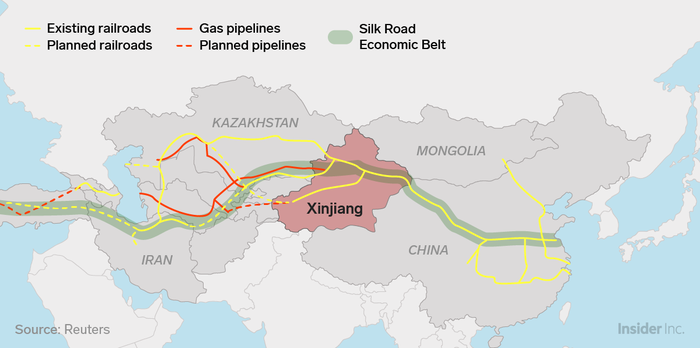So, I want to know the story of the Uyghur re-edication camps from a communist perspective. Can you tell me?
Basically there is a separatist faction in Xinjiang funded by the USA (under the NED, possibly under the CIA) using their religion as a focal point to drive this sentiment. China, rather than bomb their own people like France, the UK or the US does (between 2010 and 2019 the USA was bombing ETIM members in Pakistan and then suddenly said ETIM does not exist anymore right around the time they started attacking China for their re-education centres 🤔 🤔), decided to attack the material conditions that give rise to fundamentalist ideologies. Living remotely in (very) rural areas, for example. Poverty, of course. A lack of education. A lack of opportunities.
This sentiment is being driven by demagogues who want to create “East Turkestan” – a completely anachronistic fabrication, since Uyghurs are not the only minority in Xinjiang, Xinjiang has been an integral part of China for centuries, and most importantly, Uyghurs are not ethnically Turkic, though their language is (but that’s kinda like saying you’re German and want to unite Sweden under Germany because your mother tongue is Swedish).
They are not harmless though. They are a terrorist organisation; there have been several high-scale knife attacks in Xinjiang, with dozens of victims, perpetrated by these radicalised men.
China has invested a ton of money and effort into Xinjiang, so much so that now 80% of agriculture (you may have heard about Xinjiang cotton) is automated. Not mechanised; automated. The tractors drive themselves and the only human labour needed is two people with a shovel to lay some dirt on the tarp so it doesn’t fly away.
This happens through education and poverty alleviation. If you live 3000m above sea level in a remote village of 200 people, there is no conceivable way they can get a road or train up there. So the government builds cities that are more accessible, gifts families a brand new apartment with all modern commodities (in many places, though not necessarily in Xinjiang, they still live in adobe homes with just electricity - no running water, no plumbing). These towns can also be developed more easily and offer more economic opportunities for families, who are free to move there if they desire.
As for education, to some extent you have to “learn the country”. You have to learn Mandarin if you want to travel in China. You have to know the law if you want to resolve your conflicts in your favour. Another very poor population, the Yi, also profit from a similar program. They say themselves that factory owners (factory work is very profitable for these families when compared to subsistence farming they usually resort to) will think twice before hiring a Yi because they do not know the law. If there is a labour conflict, they might get physical because that’s how you resolve issues there. But there are proper channels to use and they give very good results. Learning the law and language improves their prospects and overall opportunities. They can live anywhere in the country afterwards, they are not limited to their province. They can read and write (Mandarin). They can go to school anywhere – in top universities in Beijing, for example. Thus they are not targets for recruitment by a terrorist organisation who will exploit their ignorance and lack of opportunities.
In Xinjiang you have two cases however, and they are very different and must not be confused. You have people who enter this program voluntarily, as we saw above. You also have people who are arrested for crimes and their sentence is to enter education programs. They are taught the same things, but they are not free to leave. I remember in 2019, an Uyghur man was tried and sentenced to these facilities because he forbid his wife from leaving home without a man, forbade her from having a job, forbade her from having her own money. If you ask me the sentence was very much appropriate. This was also something he learned from wahabbism, which is a form of fundamentalist Islam, and it has nothing to do with Islam in Xinjiang but was created in Saudi Arabia. We can note also that China is looking at these tells to catch people before they turn to terrorism – growing a long beard and not drinking alcohol are two other tells, because again they are not part of the Islam Uyghurs practice.
As for why there is so much bullshit floating around about Xinjiang (cause you probably didn’t even know of the Yi and I guarantee you the redditors saying stupid shit about freeing Xinjiang absolutely don’t), that’s because a) there is oil in Xinjiang and b) it’s a major axis for the Belt and Road Initiative, as you can see here:

So that’s why the media is told to not give a shit about the Yi who don’t want to separate from China, and focus their efforts on Xinjiang. Of course it helps that the fundamentalist, separatist movement has existed in some way since the 20th century, there’s a basis to build on already. In fact, that must be why a US army agent said around 10 years ago that if they wanted to destabilise China, they would do it through Xinjiang.
You can also download a doc the Chinese gov wrote here: http://english.www.gov.cn/archive/white_paper/2019/03/18/content_281476567813306.htm, though it’s a bit dated now as it’s from 2019. They explain the situation and what they are doing. And no, contrary to what the revisionist CPI-ML claimed, China did not in any way admit they were coercing people lol.



